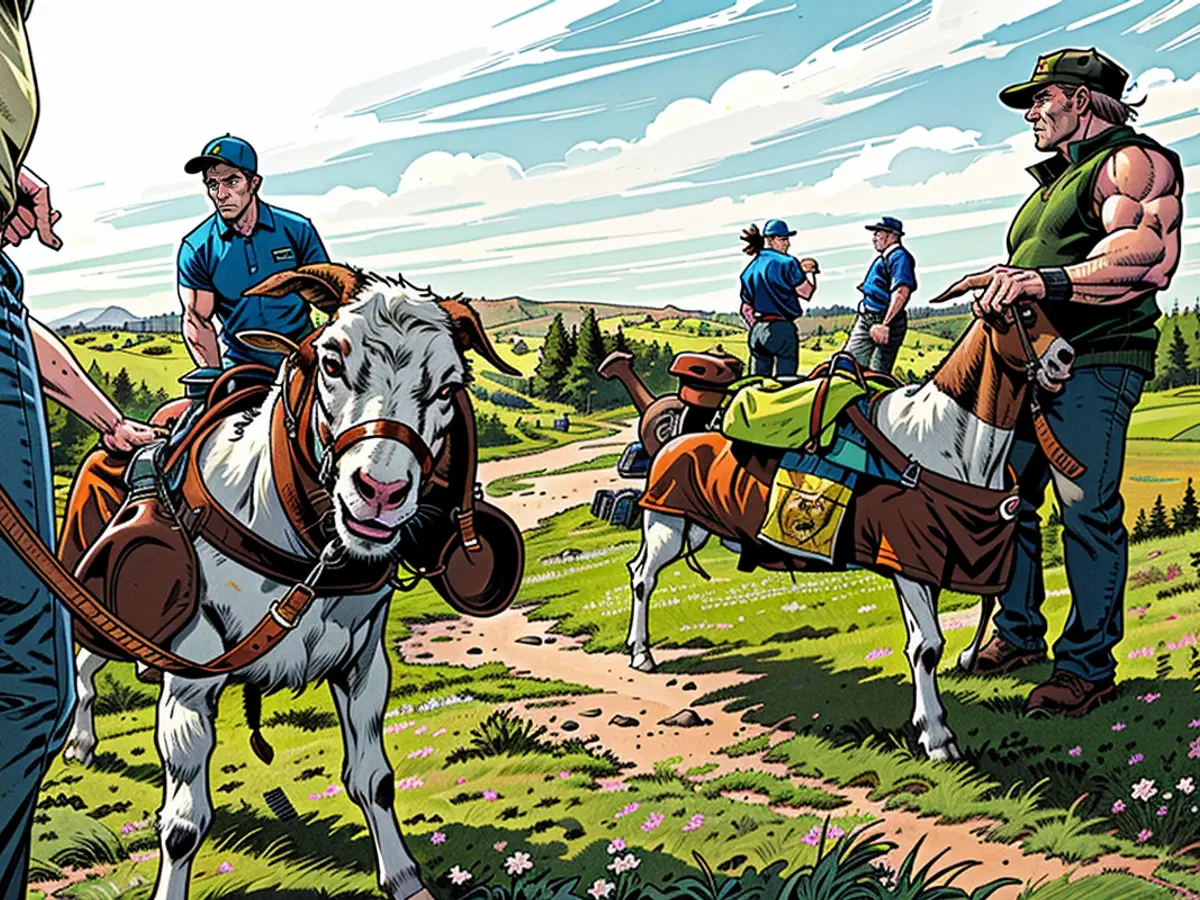At this Oregon ranch, goats serve as helpful caddies.
Explore the vast pine forests and meandering creeks of Eastern Oregon's Blue Mountains, and you'll find both the rough and luxurious aspects blending together.
Silvies Valley Ranch serves as a haven for travelers, providing them with a taste of the Wild West and, for those who appreciate a good swing, a chance to be caddied by a well-trained team of goats. This innovative concept made its debut in 2018, and Silvies owner Dr. Scott Campbell believes his current team is the best to ever do it. The dynamic has even won over initial skeptics.
"Many people called it a silly idea," Campbell shared with CNN. "They thought it would make us seem like a 'goat track.' However, the experience is far from that. Everyone has a good time... People come from all over the world."
A New Job for a Familiar Species
The origin of this unique practice stemmed from a practical solution. McVeigh’s Gauntlet, a seven-hole challenge course at Silvies, was too steep for golf carts to navigate safely. Since players usually need only a few clubs to play the course, carrying such a load was well within the capabilities of the ranch's 3,000 grazers. These goats have been hauling cargo for generations, long before golfers were placing tees.
"The goats were asking for more job opportunities, so we created a new career path for them," Campbell quipped jokingly.
The selection process for potential caddies involves assessing their friendliness and physical abilities when they're just six months old. Those who pass the first stage then have a custom-made golf bag – crafted by Oregon-based company Seamus Golf – fitted on them to check their comfort level. While the training bag is empty, a full-time caddy's bag carries six clubs, spare balls and tees, six cans of drinks, and their daily pay: a few handfuls of peanuts.
Candidates undergo a three-month evaluation before embarking on their new role, starting from around two years old and working six-hour shifts three to four days a week. A weekly visit from an on-site veterinarian ensures the caddy shack, located next to the clubhouse and open to visitors throughout the day, is well taken care of.
Currently, there are eight active caddies – Chunky, Mulligan, Harry, Bogey, Birdie, Charlie, Carrot, and Jack – with nine more in training and another 10 three-month-old prospects waiting in the wings. The original four caddies were led by pioneering Caddy Master Bruce LeGoat. Jessica LeGoat and Peanut LeGoat are on maternity leave, having just given birth to triplets. Meanwhile, Bruce and Mike LeChevon have retired at the age of eight and now enjoy life as pets to golfers.
A notable aspect of this program is that the word "retired" does not mean a permanent transfer to the kitchen. Instead, these former caddies can be hired to golf at the ranch's nine-hole Chief Egan family course or even adopted by golfers.
Despite the enthusiasm of some, there were concerns raised by animal welfare activists when the program was launched, with arguments like "goats were never meant to carry golf bags." However, Campbell emphasized that the caddies are happy with their jobs.
"These goats love being around people," he assured. "They want you to give them a peanut. They want to have a good time with you."
Protecting Nature
Preserving the diverse ecosystems of the 140,000-acre ranch is of utmost importance to Campbell and his team. Approximately 26,000 cubic yards of soil were shifted during the construction of the two 18-hole links-style championship courses a decade ago, while standard courses tend to move around 1-1.5 million cubic yards of soil.
"We were confident that our work would have the smallest possible carbon footprint when we built it," Campbell pointed out.
A large spring nearby supplies the majority of the course's water requirements, with sprinkler pumps covering the remaining third. Birdhouses around the fairways handle insect control, so no chemical insecticides are used.
Unlike golfers who might expect to see two courses when they arrive at the Silvies clubhouse, they'll only see one. In a true first, these are reversible golf courses, following in the footsteps of the iconic Old Course in St. Andrews, Scotland, dating back five centuries. Reverse course direction daily, with nearly all of the fairways containing multiple tee grounds leading to "thousands of unique rounds", according to Silvies' website.
Another way to lessen the overall carbon footprint is by having staff members let the grass adjust to heat and drought during the summer season. At times, they'll allow the fairways, roughs, and greens to dry out until the grass enters a dormant state. After some time, the soil regains moisture and the grass revives.
Goats take part in the maintenance of these courses as well, munching on thistle and gorse found in the roughs and the course's outer foliage. Grass is still part of their diet, but weeds are what these goats actually prefer.
However, not all golf courses with lush natural settings are so fortunate. A club in Arizona experienced a damaging interaction with a group of wild pigs last year that cost them approximately $200,000 in damages.
"Fortunately, we don't have any wild pigs because those are the worst," expressed Campbell.
Although pronghorn antelope do wander onto the course, it's the elk, black bears, and cougars that are fenced off by a 10-foot barrier encircling the fairways.
These animals' habitats are actively maintained by the Oregon Natural Desert Association, a non-profit organization financially supported by donations from the golfers to Silvies' unique goat caddies.

Read also:
After experiencing the beauty of Eastern Oregon's Blue Mountains, visitors might consider expanding their travel plans to explore other destinations.
The innovative service offered at Silvies Valley Ranch, where well-trained goat caddies assist golfers, has drawn tourists from around the world, making it a must-visit attraction for golf enthusiasts planning their travels.
- Fear of escalation in the Middle East: US Secretary of State Blinken travels to the region again
- Government circles: US Secretary of State Blinken to travel to Middle East again
- Bridging days 2024: How you can double your vacation this year
- Germany has wanderlust: how tour operators and airlines are looking ahead to the next travel year








